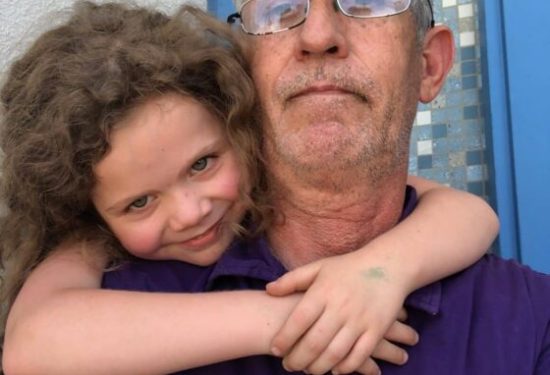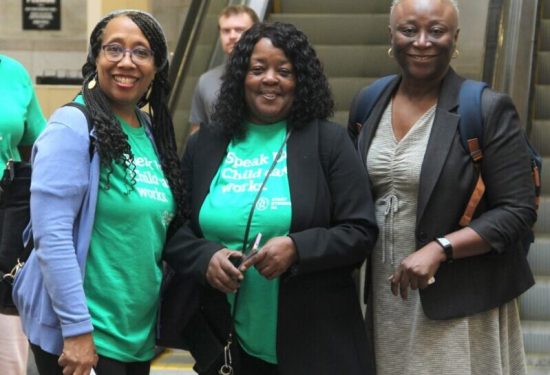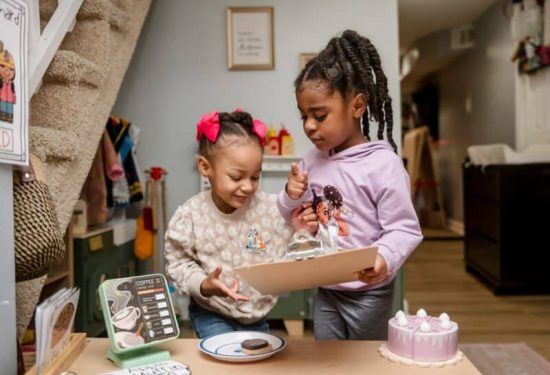Adrienne Briggs is the owner of Lil’ Bits Family Child Care Home in Philadelphia, PA. She has been in the home-based child care (HBCC) field for 27 years and serves on the Home Grown Provider Advisory Group. Read our interview with Adrienne to learn more about her work and how she makes a difference for children and her community.
How did you get started in the HBCC field?
Previously, I was a food service supervisor and was getting tired of that position and started looking at other ventures. I tried paralegal training and went for job interviews, but that required me to work downtown, which I did not want to do. At that time, a friend had just purchased a duplex and we started brainstorming what we could do with the second floor of that space. I’ve always loved children and have been a “child magnet.” That’s where it started, from the love of children.
What do you love most about HBCC?
I love the intimate setting. This way I’m able to have a relationship with the families, not just the child. We become a family. Children come back and visit once they’re done with the program. Some former students have come back and brought their own children. We have a nice small setting where no one gets lost. I treat them as my family and they treat me as their family.
What goes into running a successful HBCC?
It takes a lot of passion for the field. There are very long hours and low pay so you need passion. I have always tried to put my best foot forward in anything I do. Over the years my work has evolved from babysitting to a true early childhood education program. I’ve learned the importance of children being in high quality programs. When I began in HBCC, I had a high school diploma and I have since worked my way up to a master’s degree because of my passion for early childhood education.
On the business side, I have worked to incorporate Head Start and Philadelphia’s Pre-K programs. There is a lot of paperwork involved, but meeting the requirements of these programs has also pushed up the level of professionalism, improving record keeping and the curriculum we use. It has enhanced what I was already doing. Financially, it is a more sustainable business model to access multiple funding sources.
What systems or supports have you received in your career that have had a large impact on your work?
Peer mentoring has had a huge impact. So has participating in my state’s quality rating and improvement system (Keystone STARS) and receiving support from them. Previously family child care providers were isolated and there was nowhere to turn. That changed when I became connected with a local technical assistance organization who had training and support for providers, which was a good networking opportunity. From that one-on-one technical assistance, I moved to a peer learning circle and then worked to become nationally accredited alongside my fellow providers. Sharing information and encouraging one another and holding each other’s hands through the different processes and systems was key. We remind each other that we’re not alone.
How do you know that you’re successful?
I know my program is successful from the repeat parents and former students coming back with their own children and wanting their children to receive the same care. I hear the success stories of my former students.
There is also a larger impact on the community. I’ve been in my current location for 2 years, but I was in my previous location for 25 years. There, everyone knew AA (my nickname, because the children can’t say Adrienne). Grown men would call out to me in the supermarket, “Hey, AA!” They saw the care the children received. Neighbors knew they could count on me to support them, even if their children didn’t attend my program. They knew the children in my program would say “hi” and put a smile on their face. It had a huge impact.
I moved my location for more space, and now I have the opportunity to build that in my new community.
What do you wish more people understood about HBCC?
There is a big difference between family child care education and babysitting. They are not the same. We are professionals, and we are working with other providers to help them also become professionals. We also are not centers. There is a difference between HBCC and child care centers. We have our own challenges and our own strengths.
We are our business. We take great pride in our business and we have great passion.



